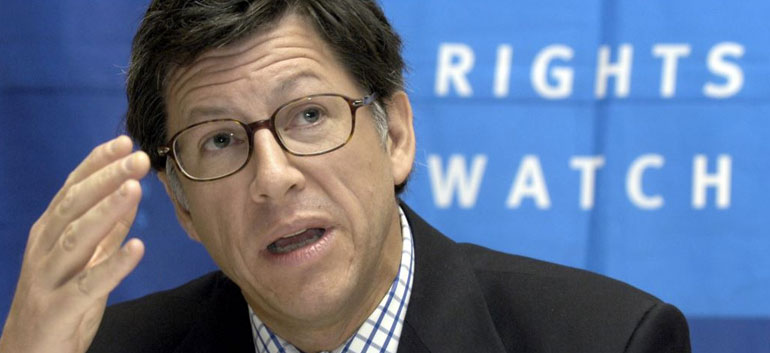Human Rights Watch (HRW), an international NGO dedicated to preserving and protecting human rights across the world, on Monday released a letter insisting that the EU renege its tentative support of Colombia’s military penal system.
Jose Miguel Vivanco, Director of the Americas Division for Human Rights Watch (HRW), released the letter to Baroness Catherine Ashton, the High Representative of the EU, in which he questioned the human rights standards across Colombia’s military.
According to HRW, the system in question is currently “at odds with international human rights standards and threatens to deny justice to victims of egregious abuses by the military.”
The letter addresses problems concerning fear of impunity given to some of Colombia’s most heinous criminals who have committed crimes against humanity, the propensity for military courts to not try their own as harshly, and the specific language within the law that would allow for allegedly too many loopholes for military criminals to easily be acquitted.
What Prompted the Letter?
This past June, Colombia’s congress passed a controversial bill that would largely restore military judicial autonomy concerning military crimes. Such privileges were stripped in 2008 over lack of military prosecution for what became known as the ‘false positives’ scandal.
The ‘false positives’ scandal involved members of Colombia’s military killing civilians and dressing them up as enemy combatants in order to boost numbers of deceased militant hostiles. So far, over 4,000 murders have been acknowledged by the Colombian government.
MORE: Colombia passes controversial military justice reform bill
FACT SHEET: False Positives
Just after the judicial bill was passed, Colombia Defense Minister Juan Pinzon met with Deputy Secretary General of the EU’s External Action Service, Helga Schmid to discuss ongoing peace talks between the Colombian government and rebel group FARC.
The main headlines from that day were largely concerning the EU’s announced support of Colombia’s ongoing peace talks, however a smaller chunk of the EU’s press release caused the reaction from HRW:
“…the EU would consider assistance in the area of military penal jurisdiction as requested by the Colombian side…”
MORE: EU offers ‘full support’ for Colombia peace talks
From this announcement, the HRW and Advocacy Director from the EU Lotte Leicht drafted the 1,300 word letter to the high representative of the EU, asking them to reconsider the statement.
‘The Fight Against Impunity”
“[Supporting military penal systems] would represent a historic setback to the progress achieved by the State of Colombia in the fight against impunity,” affirmed 11 UN specialists who examined the issue at hand. They continued, “[the military justice system reform] could seriously undermine the administration of justice in cases of alleged violations of human rights and international humanitarian law.”
This first point was given less attention than the second two in the letter, and served as more of an overarching worry and theme of the letter rather than a specific critique. This also comes after President Juan Manuel Santos, who was the Defense Minister during the time when the ‘false positives’ largely took place, and the Prosecutor General affirmed that those who contributed to the scandal should “not expect judicial leniency” in the military courts.
MORE: Serious crimes committed by the armed forces may go unpunished: Colombia President
A Lack of Impartiality and Independence?
On the topic of impartiality and the propensity for military courts to not try their own as harshly as a civilian court would, HRW cedes that there were amendments in this new law to tackle this notion, but says that it fails to address a “fundamental structural cause of the military justice system’s lack of independence and impartiality:” the military justice system does not fall under the jurisdiction of the judicial branch of government.
The military and thus military penal system falls under the authority of the Defense Minister, which in turn falls under the President, which means hat the military penal system is under the authority of the executive branch of government. Thus, “given its nature and structure, the military criminal justice system does not meet the standards of independence and impartiality set in article 8(1) of the American Convention,” the inter-Americas human rights treaty initiated in 1969.
HRW maintains that these criminals involved in the ‘false positives’ scandal must be, “investigated, as they should be, by an independent judicial authority.”
The Problem with ‘Extrajudicial Execution’
Finally, HRW tackles the language of an ‘extrajudicial execution’ and what that means for a criminal trial. At first glance, according to the letter, the amendments passed in June appear to be in agreement with the HRW’s complaints saying that the military will try all military-related crimes except for a “closed list of seven crimes including extrajudicial execution,” which will be tried in civilian court.
HRW looked closer at the wording however for what qualifies as an ‘extrajudicial execution,’ and concluded that in fact, this alone would not ensure that those accused of causing the ‘false positives’ scandal would be tried in civilian court.
Aside from the fact that the definition of an ‘extrajudicial execution’ is very narrowly defined according to HRW, the problem is that the law created after the crimes were committed and Colombian laws such as this one do not usually apply retroactively. Defense Minister ceded that “no one can be investigated and accused for a crime that did not exist at the moment it was committed,” which means that defense attorneys will likely have an easy time of keeping these ‘false positive’ cases out of civilian court.
HRW finds this “highly troubling.”
“Any EU decision to assist Colombia’s military judiciary system would run counter to principled commitments made by EU,” concluded the letter emphatically.
“[And] for all these reasons, we strongly urge you not to provide any assistance to Colombia’s military justice system as long as its jurisdiction continues to encompass human rights violations.”
Sources
- Letter to EU High Representative Catherine Ashton on Colombia (Human Rights Watch)
- Colombian Defense Minister visits Brussels (EU)


